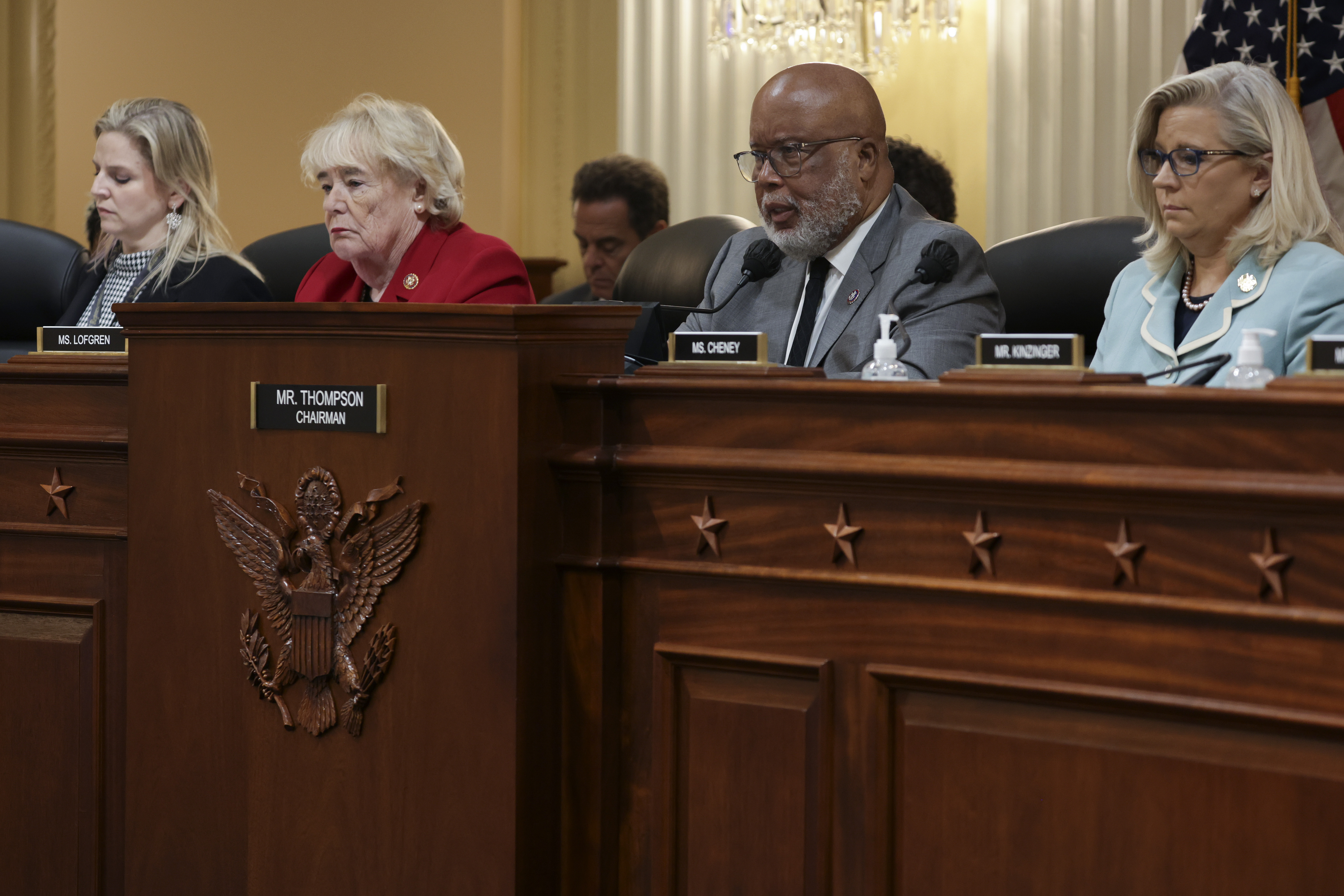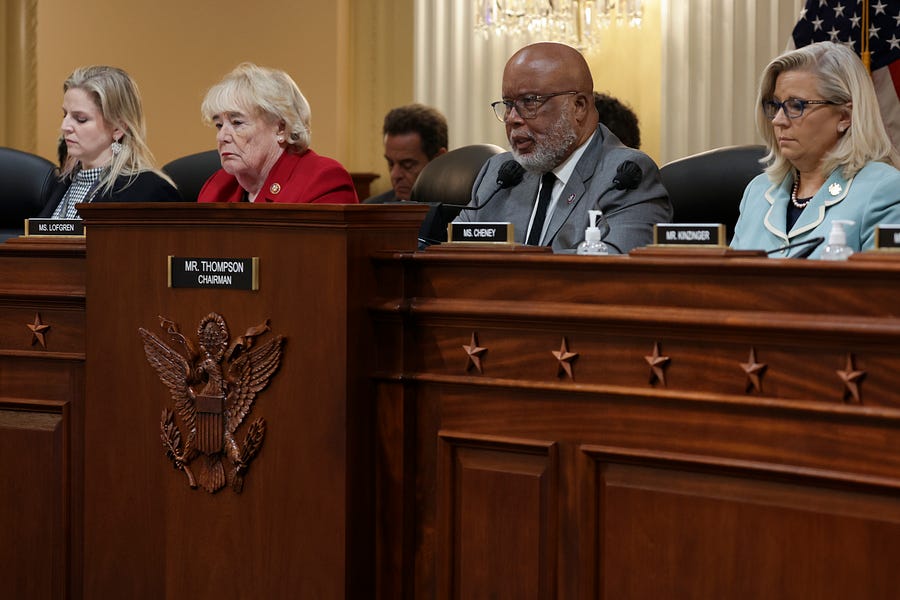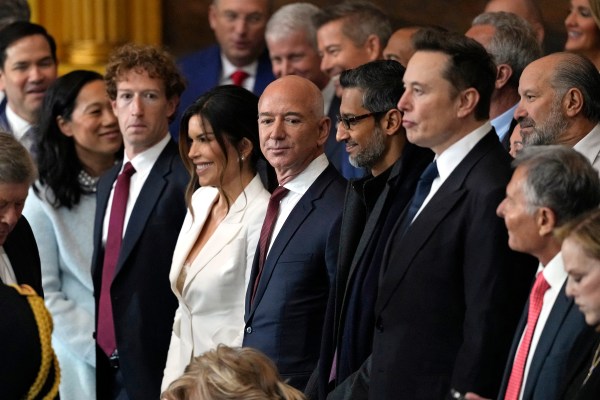Happy Tuesday! Japanese scientists have created a robot finger encased in living skin, and have big plans to improve their design with fingernails and hair. We’re prepared to believe that’s all scientifically useful—but did they have to describe the finger as “slightly sweaty”?
Quick Hits: Today’s Top Stories
-
The S&P 500 fell 3.9 percent Monday, closing more than 20 percent below its all-time high set in January—the benchmark for a bear market—amid continued high inflation and fears of excessive tightening by the Federal Reserve. The tech-heavy Nasdaq has been in a bear market for a while, but the Dow is still about 4 percent above that mark. Cryptocurrency continued its plummet, with Bitcoin at one point on Monday down 67 percent from its November high.
-
Seventy-three members of Iraq’s parliament loyal to influential Shiite cleric Muqtada al-Sadr resigned at his direction Sunday after seven months spent trying to form a coalition government with Sunni and Kurdish blocs in Iraq’s 329-seat parliament. Talks had broken down over who would be president, and Sadr—who has no formal political position—described the mass resignation as a sacrifice to allow the formation of a government. He has previously swapped political negotiations for street protests, sparking fears he will do so again and further destabilize Iraq.
-
Blocked by protestors, Libya’s oil output has dropped by 1.1 million barrels per day from last year’s average of 1.2 million barrels per day, Oil Minister Mohamed Oun said Monday. That’s down from about 600,000 barrels a day in April. Prime Minister Abdul Hamid Dbeibah and former interior minister Fathi Bashagha have rival governments each backed by militias, and protestors have targeted oil production and shipping.
-
Russian troops are still fighting to encircle the city of Sievierodonetsk in eastern Ukraine, which would give them control of every major city in the Luhansk region of Donbas. Regional official Serhiy Gaidai said Russian forces have destroyed the last bridge to the city, trapping civilians and blocking humanitarian supplies. Gaidai said Russia controls more than half of the city but the situation of Ukrainian troops is “difficult but under control.” Ukrainian officials have warned some units in eastern Ukraine are running low on artillery shells for Soviet-era weapons and do not yet have enough newer artillery pieces to replace the older systems.
-
Beijing officials have reintroduced mass testing mandates and closed public venues less than a week after lifting harsh restrictions, warning of a “ferocious” COVID-19 outbreak after the official case count increased sixfold over the weekend. Shanghai officials have also instituted mass testing in 15 of the city’s 16 districts.
-
United Nations human rights head Michelle Bachelet said Monday she won’t seek another turn in the role when her four-year term ends in August. She cited personal reasons and said the decision was made before recent sharp criticism from U.S. officials and others for her trip to China—Bachelet made a China-controlled visit and praised its poverty reduction efforts while using China’s counter-terrorism terminology for mass detainment of Uyghurs and other ethnic and religious minorities.
January 6 Committee: Team Trump vs. Trump

As the votes were counted and Joe Biden’s victory came into focus, Donald Trump spent the days and weeks following the 2020 election on a mammoth campaign of conspiracy-mongering grievance, insisting the race had been ripped away from him through massive systemic fraud. All available facts opposed this narrative. So too—as we now know—did many senior members of the White House and his campaign.
This much was made clear during Monday’s second day of the January 6 committee’s public proceedings, during which a remarkable assortment of former (and current!) Trump associates offered variations on the same testimony: Before, during, and after the election, they had pushed back against the president on his fantastical claims that the fix was in. But Trump had consistently ignored these voices, choosing instead at every critical moment to throw in with the more flattering—if far crazier—voices belonging to the likes of Sidney Powell and Rudy Giuliani.
“You will also hear testimony that President Trump rejected the advice of his campaign experts on election night,” committee co-chair Liz Cheney said in her opening remarks, “and instead followed the course recommended by an apparently inebriated Rudy Giuliani to just claim he won and insist that the vote counting stop—to falsely claim everything was fraudulent.”
It was a remarkable day of testimony even despite the absence of the man who had been billed as its star witness: Bill Stepien, Trump’s campaign manager during the closing act of the 2020 campaign. Stepien requested and received a release from his subpoena at the last moment due to some truly inconvenient timing: His wife had gone into labor. His lawyer appeared and offered a prepared statement instead, and the committee aired video clips from an earlier interview with Stepien.
It’s been painfully clear for years that Trump’s “stop the steal!” rabble-rousing was built on a combination of carnival-barker showmanship and craven self-interest. But what Trump’s own former officials and advisers made clear Monday was how utterly Trump lacked even any reasonable pretext for making those claims. People he trusted told him the 2020 election was stolen, which kicked off a chain reaction in which he grew more and more suspicious of more and more innocuous election phenomena. But Trump should have known—did know, according to testimony provided to the January 6 committee—that his narrative was ludicrous from the start.
“There was never an indication of interest in what the actual facts were,” Attorney General William Barr said in prerecorded testimony played at the hearing Monday. “I was somewhat demoralized, because I thought, ‘Boy, if he really believes this stuff—he’s become detached from reality if he really believes this stuff.”
In Barr’s telling, that detachment from reality began on election night itself: “Right out of the box on election night, the president claimed that there was major fraud underway. I mean, this happened, as far as I can tell, before there was actually any evidence. It seems to be based on the dynamic that, at the end of the evening, a lot of Democratic votes came in, which changed the vote counts in certain states. And that seems to be the basis for this broad claim that there was major fraud.”
Mere hours after polls closed, then, factions were already forming in Trump’s inner circle—Giuliani on one side, the bulk of Trump’s professional staff on the other. Stepien, in previously recorded testimony, talked about how he resisted Giuliani’s urging Trump to declare victory that night: “It was far too early to be making any calls like that—ballots were still being counted, ballots were still going to be counted for days.”
In his testimony, former Fox News political editor Chris Stirewalt—better known around here as a contributing editor of The Dispatch—underscored why Stepien’s argument was not just correct, but painfully obvious: Republicans have for decades done better early in the vote count in places where election-day ballots are counted first, a phenomenon known as the “red mirage.” But 2020 was different in two ways: No previous election since the dawn of mail-in voting had taken place against the backdrop of a pandemic that polarized the election day vs. mail-in returns more than ever before, meaning the red mirage was more powerful than it had ever been before—and no previous political campaign had tried to use that fleeting mirage to convince their supporters that the election itself had been fatally compromised.
“We had gone to pains—and I’m proud of the pains we went to—to make sure that we were informing viewers that this was gonna happen,” Stirewalt said, “because the Trump campaign and the president had made clear that they were going to exploit this anomaly.”
And that’s just what Trump did, in a speech delivered after 2 a.m. on the morning following election night. “This is a fraud on the American public,” the president said then. “This is an embarrassment to our country. We were getting ready to win this election. Frankly, we did win this election. … We want all voting to stop. We don’t want them to find any ballots at 4 o’clock in the morning and add them to the list.”
Once the president fully committed to the conspiracy caucus in his office, staffers and officials testified, there was no reasoning him back: He simply careened from one conspiratorial allegation to another in a pattern Barr likened to a game of “Whac-a-Mole.”
“There were so many of these allegations,” former deputy attorney general Richard Donoghue testified in recorded testimony, “that when you gave him a very direct answer on one of them, he wouldn’t fight us on it, but he would move to another allegation.”
“I said something to the effect of, ‘Sir, we’ve done dozens of investigations, hundreds of interviews,” Donoghue said. “The major allegations are not supported by the evidence developed. We’ve looked in Georgia, Pennsylvania, Michigan, Nevada. We’re doing our job. Much of the info you’re getting is false.”
To say these claims were widely corroborated in Monday’s hearing would be an understatement. The chorus of sworn testimony from former Trump allies that they had told him the truth about the 2020 election was vast.
There was former acting Attorney General Jeffrey Rosen, who took over following Barr’s December resignation: “We were in a position to say our people have already looked at [Trump’s claims of fraud], and we know that you’re getting bad information that’s not correct—it’s been demonstrated to be incorrect, from our point of view has been debunked.”
There was Derek Lyons, counselor to the president, who testified that Trump’s lawyers Erick Herschmann and Pat Cipollone had told Trump in December that “none of these allegations had been substantiated to the point where they could be the basis for any litigation challenge to the election.”
There was Herschmann himself, who testified about Giuliani and Powell’s legal theories: “I thought the Dominion stuff was—I never saw any evidence whatsoever to sustain those allegations.”
There was Alex Cannon, another former Trump campaign lawyer, about Powell’s obsession with supposedly compromised voting machines manufactured by Dominion Voting Systems: “I didn’t believe the Dominion allegations because I thought the hand recount in Georgia would resolve any issues with the technology problem and with Dominion flipping votes.” (Cannon testified that his pushback prompted Peter Navarro—a Trump adviser currently facing charges of contempt of Congress for refusing to testify before the January 6 committee—to accuse him of being “an agent of the deep state.”)
Inflation Sets Another 40-year Record
Not to be dramatic, but inflation has snatched our wallets, chucked them in a grocery cart, doused it in gasoline, and pushed the whole thing into a blast furnace while the Federal Reserve has been running around in the background yelling DON’T PANIC and brandishing a fire extinguisher on a time delay.
Okay, that’s a little dramatic. But you get the idea.
And we’re far from the only ones feeling this way—the University of Michigan reports consumer sentiment has hit a record low. Which is kind of fair, based on Friday’s inflation report. In May, the Consumer Price Index report showed, inflation hit yet another 40-year high of 8.6 percent year over year, reversing April’s fall to 8.3 percent.
Gas prices helped lead the way, rising 4.1 percent from April to May and topping an average of $5 a gallon Sunday, according to automobile association AAA. One Massachusetts gas station owner stopped selling fuel in protest—which seems counterproductive, but we appreciate the thought. Even the IRS has noticed rising gas prices, hiking its maximum mileage reimbursement rate to compensate. “The pain U.S. consumers are feeling at the pump will get worse before it gets better,” analysts at credit ratings firm Moody’s Analytics wrote Thursday, predicting prices may reach $5.50 over the next few weeks, but then forecasting a steady decline.
Other prices outpaced gasoline’s gains. Airfare rose 13 percent from April to May, and housing jumped 5.5 percent. Food overall rose 1.2 percent May over April, including a 5 percent increase in the price of eggs, thanks in part to an outbreak of bird flu. The U.S. Department of Agriculture estimates this outbreak will spike the price of eggs by about 20 percent this year. Bad news for Gaston.
“Today’s report underscores why I have made fighting inflation my top economic priority,” President Joe Biden said in a statement Friday, again blaming inflation partly on corporate profit margins. “The United States is on track to produce a record amount of oil next year, and I am working with the industry to accelerate this output. But it is also important that the oil and gas and refining industries in this country not use the challenge created by the war in Ukraine as a reason to make things worse for families with excessive profit taking or price hikes.”
Economists’ explanations for this month’s inflation haven’t changed much from previous months. Recent events have compounded past policy errors. China’s lockdowns interrupted still bedraggled supply chains and the ongoing boycott of Russian energy—plus OPEC’s merely tepid oil output hike in response—kept fuel prices up. The war in Ukraine has also blocked food exports, particularly of wheat and food oils. “Russia’s invasion of Ukraine could hardly have come at a worse time for global food logistics given the pandemic still has supply chains clogged up,” argued Gabriel Tay, associate economist at Moody’s Analytics, adding that some countries are restricting food exports to protect their own supply. “Protectionist trade policies are likely to result in price increases across a broad array of food products.”
The report also hasn’t changed most economists’ prediction that inflation will inch its way down over the next year—though still-tight housing and rental markets will help keep it from dropping quickly. Stripping the volatile food and fuel categories yields a core inflation rate of 6 percent, slightly lower than April. That doesn’t erase the wallet pangs of food and fuel inflation, but core inflation is a better predictor of where the economy is likely headed, so its moderation is a good sign.
But continued high inflation means we’re all still waiting for the Fed’s fire extinguisher to kick in. Even before Friday’s report, central bank leaders have signaled they’re still on track to raise rates. “I’m going to be looking to see a consistent string of decelerating monthly prints on core inflation before I’m going to feel more confident that we’re getting to the kind of inflation trajectory that’s going to get us back to our 2 percent goal,” Fed vice chair Lael Brainard told CNBC. The Fed measures that 2 percent goal with a different but related inflation index than the one reported Friday.
The central bank is expected to raise interest rates half a percentage point this week and again in July. The market isn’t thrilled about the prospect of rising interest rates and after Friday’s inflation news the Dow Jones Industrial average dropped 2.7 percent. Monday, the S&P 500 fell 3.9 percent, closing in a bear market. Market unease reflects the possibility that the Fed might up its planned September hike from a quarter to half a percentage point thanks to Friday’s report—or even increase its planned June and July hikes.
“There’s little respite from four-decade high inflation until energy and food costs simmer down and excess demand pressures abate in response to tighter monetary policy,” Sal Guatieri, senior economist at BMO Capital Markets, said in a note Friday. “The Fed might still raise policy rates ‘just’ 50 bps next week, but it could easily ratchet up the pace beyond then if inflation keeps surprising to the high side.”
Worth Your Time
-
Pervasive internal “cancel culture” has convulsed many progressive groups and kept them from coherent pursuit of policy goals—a self-destruction so strong it seems almost deliberate, Ryan Grim reports in a scorcher for The Intercept. “Prolonged combat has become standard, whether the triggering event is a cataclysmic one like Charlottesville or more prosaic, like a retweet of an offensive joke by a Washington Post reporter,” Grim writes. “The initial event prompts a response from staff, which is met by management with a memo or a town hall; in either case, the meeting or the organization-wide message often produces its own cause for new offense, a self-reproducing cycle that sucks in more and more people within the organization, who have either been offended, accused of giving offense, or both, along with their colleagues who are required to pick a side. … ‘We used to want to make the world a better place,’ said one leader of a progressive organization. ‘Now we just make our organizations more miserable to work at.’”
-
Hong Konger Karen Cheung describes the double devastation of increasing political oppression and COVID-19 restrictions on the city, and the stay-or-go quandary of longtime residents. “As the national security law altered the terrain of what was permitted, and the government flip-flopped on pandemic plans such as whether to conduct mass testing every few days, Hong Kong became an unpredictable, unlivable city,” Cheung writes for New York Magazine. “I sometimes think that the curse of this generation of Hong Kongers—those who are not already behind bars—is survivor’s guilt. How selfish is that, to want our lives to change or even improve, when there are so many in prison for rioting and political charges, when so many have died during the pandemic, when there are those who are forcibly exiled and will never see the waters of Hong Kong again?”
Presented Without Comment
Also Presented Without Comment
Toeing the Company Line
-
David and Sarah hit up SCOTUS decisions about double jeopardy and ineffective counsel on the new Advisory Opinions before discussing what stochastic terrorism has to do with the recent attempted murder of Justice Brett Kavanaugh. Plus—the Senate has been making plenty of headlines for stalling out on major legislation, but will the House be the holdup on the new gun control framework?
-
Charlotte didn’t time her latest piece to the United Nations’ human rights director’s announcement that she’s leaving, but she may as well have—it takes a look at how bad state actors have hijacked the U.N.’s attempts to uphold human rights. Also on the site, Eric Edelman argues Turkish President Recep Tayyip Erdoğan’s list of demands before he’ll approve Finland and Sweden’s NATO bids has damaged Turkey’s international standing and security.
-
Dispatch Live returns tonight with Steve, Sarah, and David discussing the Jan. 6 hearings so far—what we’ve learned, and what, if anything, the hearings could change. Tune in at 8 p.m. ET.
Let Us Know
Whether you watched Monday’s Jan. 6 hearing or only read about it above—what testimony stood out to you the most?







Please note that we at The Dispatch hold ourselves, our work, and our commenters to a higher standard than other places on the internet. We welcome comments that foster genuine debate or discussion—including comments critical of us or our work—but responses that include ad hominem attacks on fellow Dispatch members or are intended to stoke fear and anger may be moderated.
With your membership, you only have the ability to comment on The Morning Dispatch articles. Consider upgrading to join the conversation everywhere.